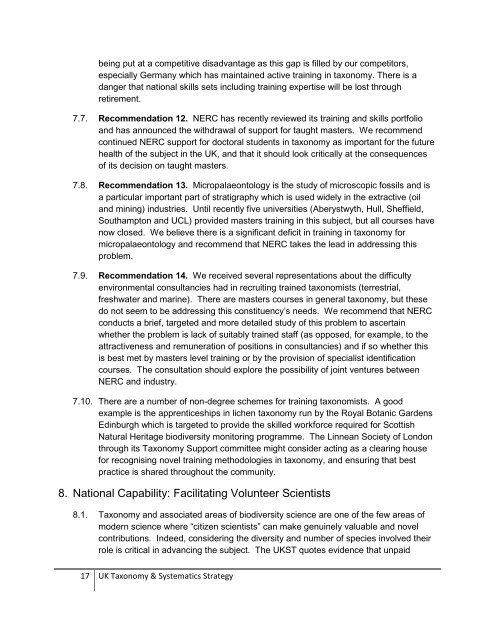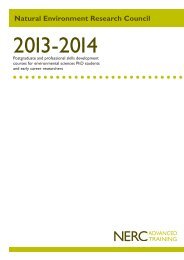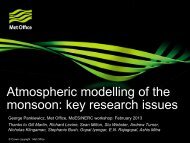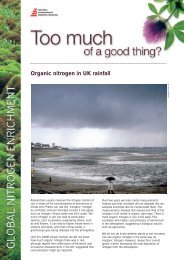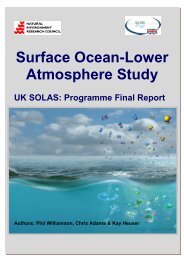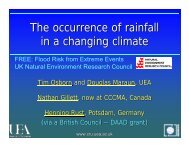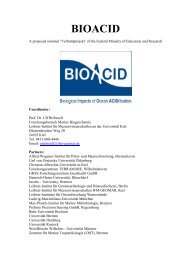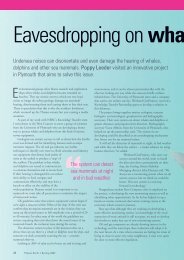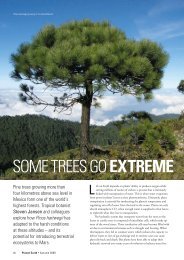Developing a National Strategy in Taxonomy & Systematics (168KB)
Developing a National Strategy in Taxonomy & Systematics (168KB)
Developing a National Strategy in Taxonomy & Systematics (168KB)
Create successful ePaper yourself
Turn your PDF publications into a flip-book with our unique Google optimized e-Paper software.
e<strong>in</strong>g put at a competitive disadvantage as this gap is filled by our competitors,<br />
especially Germany which has ma<strong>in</strong>ta<strong>in</strong>ed active tra<strong>in</strong><strong>in</strong>g <strong>in</strong> taxonomy. There is a<br />
danger that national skills sets <strong>in</strong>clud<strong>in</strong>g tra<strong>in</strong><strong>in</strong>g expertise will be lost through<br />
retirement.<br />
7.7. Recommendation 12. NERC has recently reviewed its tra<strong>in</strong><strong>in</strong>g and skills portfolio<br />
and has announced the withdrawal of support for taught masters. We recommend<br />
cont<strong>in</strong>ued NERC support for doctoral students <strong>in</strong> taxonomy as important for the future<br />
health of the subject <strong>in</strong> the UK, and that it should look critically at the consequences<br />
of its decision on taught masters.<br />
7.8. Recommendation 13. Micropalaeontology is the study of microscopic fossils and is<br />
a particular important part of stratigraphy which is used widely <strong>in</strong> the extractive (oil<br />
and m<strong>in</strong><strong>in</strong>g) <strong>in</strong>dustries. Until recently five universities (Aberystwyth, Hull, Sheffield,<br />
Southampton and UCL) provided masters tra<strong>in</strong><strong>in</strong>g <strong>in</strong> this subject, but all courses have<br />
now closed. We believe there is a significant deficit <strong>in</strong> tra<strong>in</strong><strong>in</strong>g <strong>in</strong> taxonomy for<br />
micropalaeontology and recommend that NERC takes the lead <strong>in</strong> address<strong>in</strong>g this<br />
problem.<br />
7.9. Recommendation 14. We received several representations about the difficulty<br />
environmental consultancies had <strong>in</strong> recruit<strong>in</strong>g tra<strong>in</strong>ed taxonomists (terrestrial,<br />
freshwater and mar<strong>in</strong>e). There are masters courses <strong>in</strong> general taxonomy, but these<br />
do not seem to be address<strong>in</strong>g this constituency’s needs. We recommend that NERC<br />
conducts a brief, targeted and more detailed study of this problem to ascerta<strong>in</strong><br />
whether the problem is lack of suitably tra<strong>in</strong>ed staff (as opposed, for example, to the<br />
attractiveness and remuneration of positions <strong>in</strong> consultancies) and if so whether this<br />
is best met by masters level tra<strong>in</strong><strong>in</strong>g or by the provision of specialist identification<br />
courses. The consultation should explore the possibility of jo<strong>in</strong>t ventures between<br />
NERC and <strong>in</strong>dustry.<br />
7.10. There are a number of non-degree schemes for tra<strong>in</strong><strong>in</strong>g taxonomists. A good<br />
example is the apprenticeships <strong>in</strong> lichen taxonomy run by the Royal Botanic Gardens<br />
Ed<strong>in</strong>burgh which is targeted to provide the skilled workforce required for Scottish<br />
Natural Heritage biodiversity monitor<strong>in</strong>g programme. The L<strong>in</strong>nean Society of London<br />
through its <strong>Taxonomy</strong> Support committee might consider act<strong>in</strong>g as a clear<strong>in</strong>g house<br />
for recognis<strong>in</strong>g novel tra<strong>in</strong><strong>in</strong>g methodologies <strong>in</strong> taxonomy, and ensur<strong>in</strong>g that best<br />
practice is shared throughout the community.<br />
8. <strong>National</strong> Capability: Facilitat<strong>in</strong>g Volunteer Scientists<br />
8.1. <strong>Taxonomy</strong> and associated areas of biodiversity science are one of the few areas of<br />
modern science where “citizen scientists” can make genu<strong>in</strong>ely valuable and novel<br />
contributions. Indeed, consider<strong>in</strong>g the diversity and number of species <strong>in</strong>volved their<br />
role is critical <strong>in</strong> advanc<strong>in</strong>g the subject. The UKST quotes evidence that unpaid<br />
17 UK <strong>Taxonomy</strong> & <strong>Systematics</strong> <strong>Strategy</strong>


